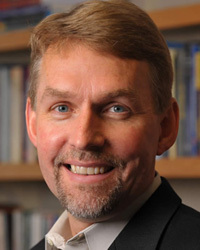
As debate about how to improve education continues across the country, research currently underway at the University of Notre Dame will significantly contribute to the conversation.
Mark Berends, a professor of sociology and education, is conducting two studies that seek to understand instruction’s role in student achievement.
“It’s not just about assessment data, and it’s not only about evaluation,” Berends says. “It’s to help with school improvement efforts.”
The first project, funded by a Walton Family Foundation grant awarded to Notre Dame’s Institute for Educational Initiatives (IEI), helps Catholic schools in nine U.S. cities report student achievement data. The schools then use the data to see levels and growth in achievement over time to assess challenges and opportunities.
Berends says this is a new approach for some Catholic schools because they aren’t subject to laws like No Child Left Behind that require public schools to report test scores. One of the challenges is the lack of uniform data: Schools choose their own student assessments and data structures, and while comparing institutions isn’t a primary goal, doing so becomes tricky when formats vary.
“We’re excited about the prospects of this because we think that over time this will be a great opportunity for Notre Dame and IEI to provide additional services to Catholic schools in this country,” Berends says.
Berends also directs the “National Center on School Choice”: (NCSC), an intercollegiate, research center funded by the Department of Education’s Institute of Education Sciences (IES).
The center’s What Makes Schools Work project examines student achievement in different types of public and private schools. The study surveyed roughly 2,500 teachers in 100 schools. The point, says Berends, is to understand what’s going on in the schools.
“There have been a lot of studies that looked at overall effects of charter schools versus public schools,” he says. “This really goes deeper to understand the organization, instructional processes, teacher work lives, and leadership differences to see if that explains some of the differences in something like test scores.”
Data analysis currently is underway, and findings will inform researchers, educators and policy makers who are interested in school choice—especially charter schools, a focus of the U.S. Department of Education.
If education is moving in the direction of charter schools, says Berends, then we need to know what to consider in order to implement them well.
“A big part of this project,” he says, “is looking at differences between charter, magnet and private schools compared to traditional public schools to understand where school choice can be effective and where it can present certain challenges.”
As an independent center, the NCSC does not endorse a particular type of school.
The research will inform implementation, Berends says, but will not provide blueprints for how to create schools. The project also looks at teachers’ expectations in math instruction.
“When you’re covering a topic in mathematics, what level of cognitive complexity are you expecting of students?” he asks. “Is it lower-order simple basic skills, or analytical thinking and making connections?”
Teachers’ responses to objective survey questions help researchers understand the effect instructional differences have in the various types of schools.
When they complete the survey, participants can immediately see how their responses compare in their school, district and state. The survey is so specific that researchers can connect a teacher with a group of their students. That, says Berends, enables the teacher to see whether they need to adjust their course content to better address assessment standards.
Both the Walton Family Foundation and the IES grants enable unprecedented research and knowledge. “This has the opportunity to be really helpful for schools,” Berends says.
Contact: Mark Berends, mberends@nd.edu